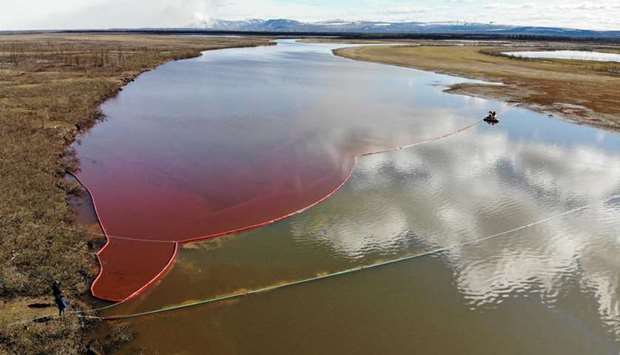Russian mining giant Norilsk Nickel (Nornickel) said yesterday that it had stopped the discharge of wastewater from one of its Arctic facilities, one month after an unprecedented fuel leak nearby sparked a state of emergency.
The incident occurred at the Talnakh enrichment plant near the Arctic city of Norilsk, the company said, when liquids used to process minerals were “discharged from a reservoir”.
“Measures were taken to stop” the removal of the liquid into nearby territory, the company said, adding that there was no threat of waste leaking.
A source in the emergencies ministry however told the RIA Novosti news agency that the discharge of toxic substances could pose a threat to the nearby Kharayelakh river.
The Investigative Committee, which probes serious crimes, said it had received reports of “unauthorised dumping of liquid waste into the tundra” on the site of the facility and had opened an enquiry.
Independent newspaper Novaya Gazeta published videos of the scene in a report claiming the factory had deliberately discharged the wastewater into nearby wildlife areas.
Novaya Gazeta journalists said Norilsk Nickel employees had hastily removed pipes when investigators and emergency services arrived on the scene.
Norilsk Nickel spokeswoman Tatiana Egorova confirmed to AFP that the employees of the factory had pumped “purified water from the reservoir” and that an internal investigation is under way.
A spokeswoman for Russia’s natural resources agency said the decision to remove water from the reservoir was taken to avoid an emergency, after heavy rains and tests had caused water levels to increase dramatically.
“To prevent possible emergencies due to increasing water levels in the basin, the operating personnel decided promptly to lower the water level,” Svetlana Radionova said.
Norilsk Nickel was at the centre of another incident last month when more than 21,000 tonnes of diesel leaked into soil and rivers after a fuel reservoir collapsed at a power plant also near Norilsk.
The accident took place at a plant owned by a subsidiary of Norilsk Nickel, which said the collapse may have been caused by melting permafrost due to climate change.
President Vladimir Putin declared an emergency situation after the accident and the head of Norilsk Nickel, oligarch Vladimir Potanin, promised to pay the costs of the clean-up.
The Russian authorities said earlier this month they had cleared the spill from the surface of a river hit by the massive diesel spill, but the full clean-up could take years.
Meanwhile, water and soil samples that were taken near the site of last month’s fuel spill and prepared for tests at an independent lab have been held up at the Norilsk airport, a lawmaker and Greenpeace said on Saturday.
The company and emergency specialists are collecting contaminated soil and fuel from local rivers into containers.
Sergei Mitrokhin, a lawmaker at Moscow legislature, said he was trying to fly out of Norilsk on Saturday with samples in his baggage, when the airport security held him up on suspicion that he was trying to carry combustible materials.
“I had to leave the baggage behind. First, they had referred to the order of the security service of Nornickel, which had to clear transportation of all the samples,” he told Reuters. “Then they said the police had received an anonymous call that the baggage could contain some combustible materials.”
Nornickel, in e-mailed comments, cited Sergei Erastov, deputy head of security at the Norilsk airport, as saying that the passengers carried samples of water and soil without necessary documents.
He said they were given the option of leaving the samples at a temporary baggage storage or doing the right paperwork.
A police serviceman on duty at the airport, Sergei Kuzmin, told Reuters that the security service had not allowed the samples to be taken on board due to lack of clearance documents.
Mitrokhin was in Norilsk at the request of reporters from Novaya Gazeta.
They shared details of the fallout from the spill and handed over the samples, collected by the activists from Greenpeace.
Greenpeace said the samples, collected from the river Pyasina, “were confiscated” at the Norilsk airport.
Greenpeace says numerous attempts to get independent data on oil pollution from the area have been blocked.
The company has said the bulk of the spilled fuel has been cleaned up.

This handout photograph taken and released by the Marine Rescue Service of Russia earlier this month shows the large diesel spill in the Ambarnaya River, outside Norilsk.
